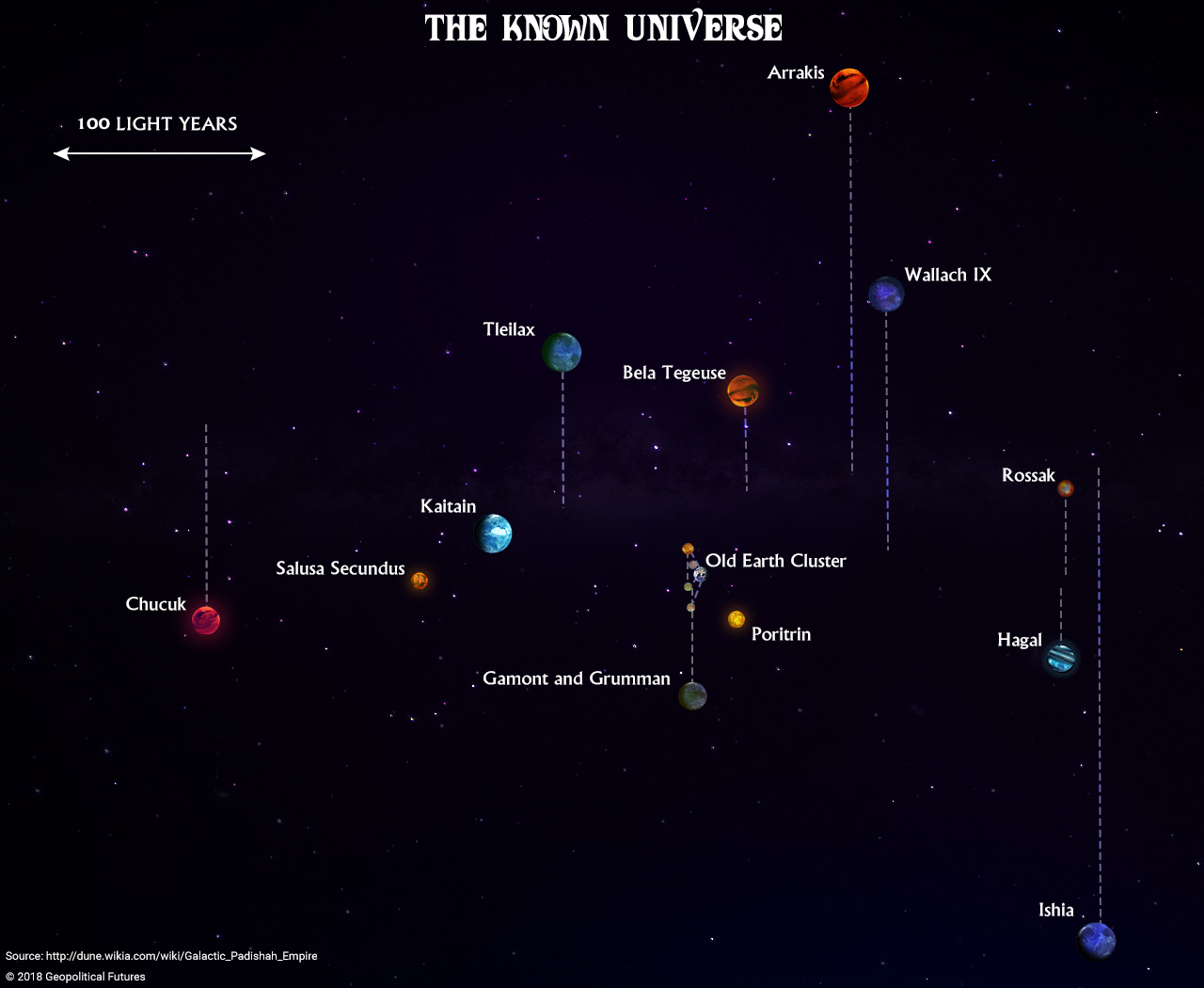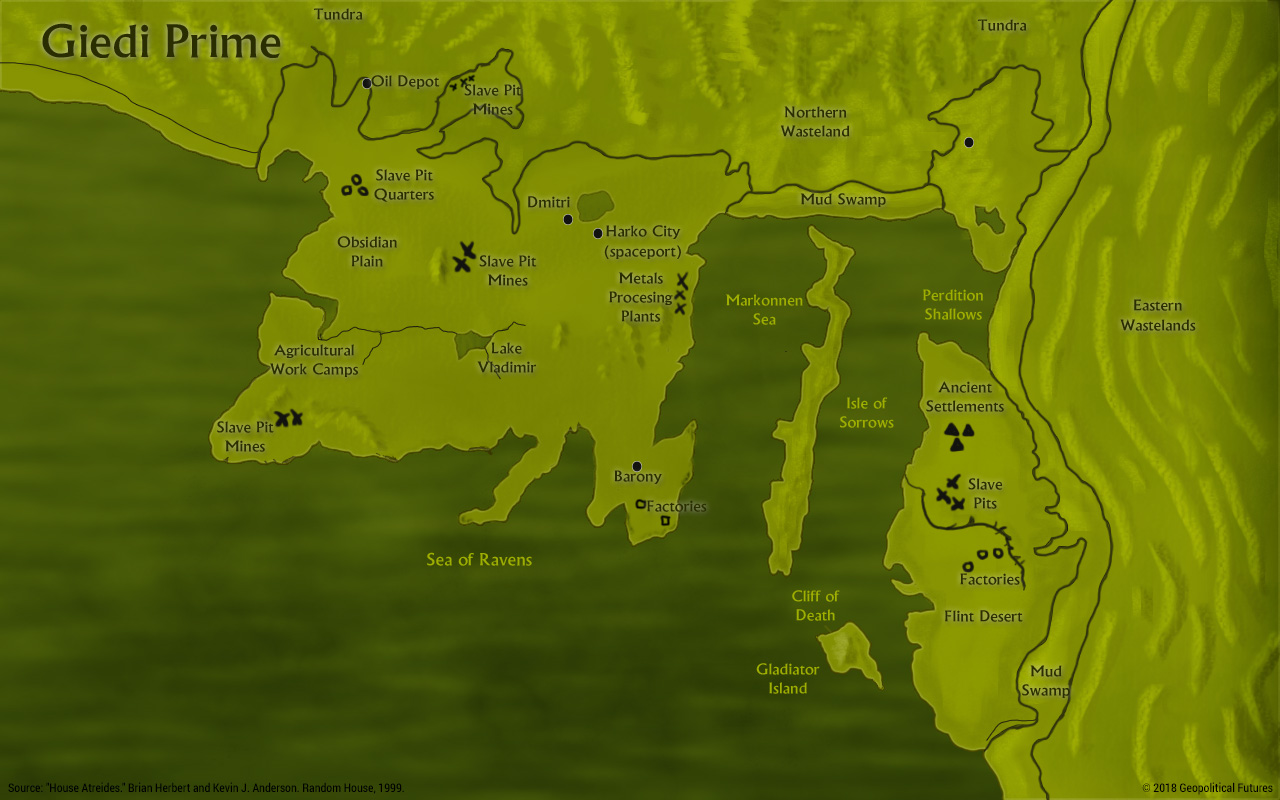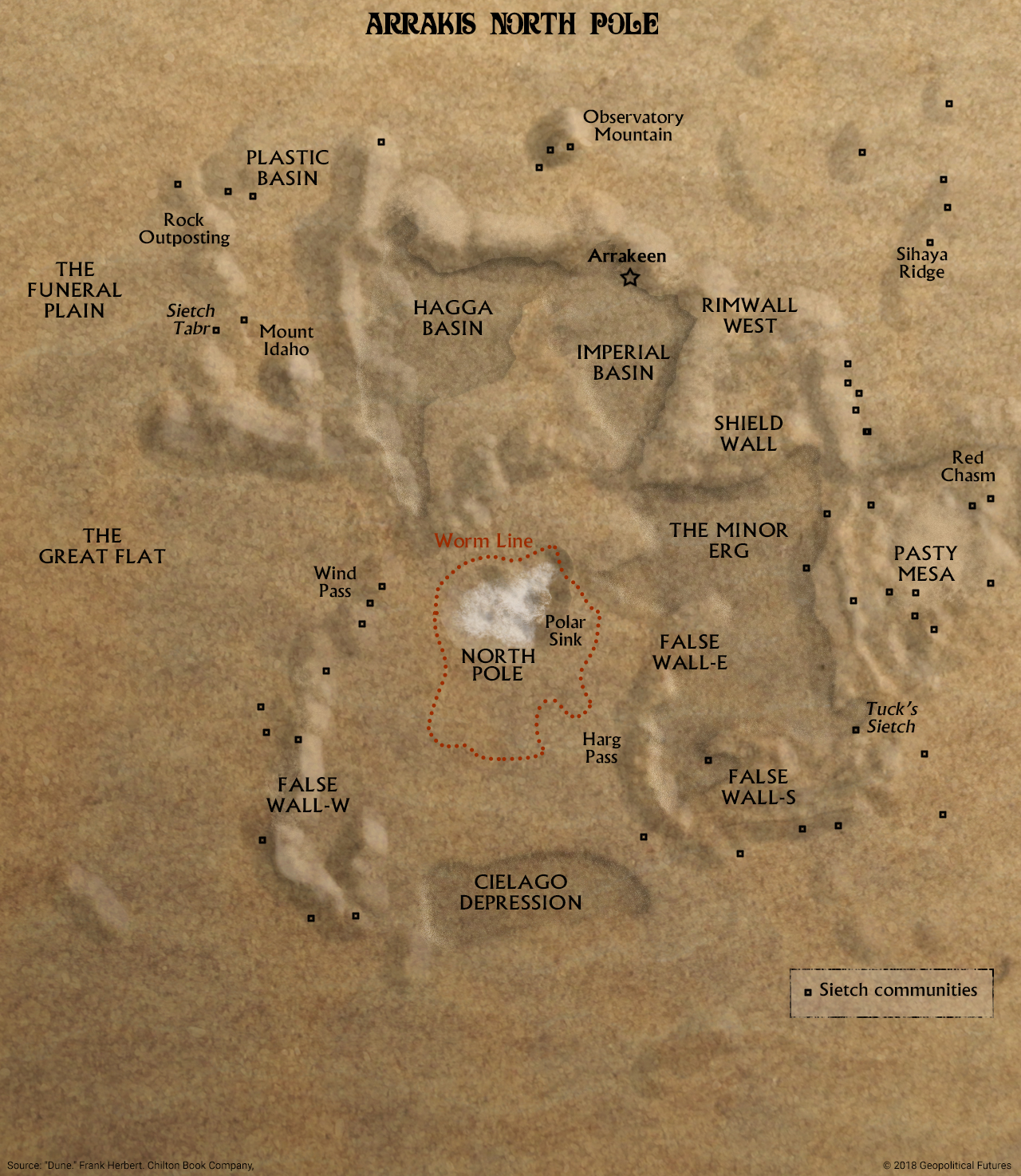“Grave this on your memory, lad: A world is supported by four things …” She held up four big-knuckled fingers. “ … the learning of the wise, the justice of the great, the prayers of the righteous and the valor of the brave. But all of these things are as nothing …” She closed her fingers into a fist. “… without a ruler who knows the art of ruling. Make that the science of your tradition!”
From “Dune” by Frank Herbert
It took a long time for geopolitics to reach the void of outer space. Space, after all, is the absence of geography. Space is almost uniformly lifeless, expansive and unforgiving. But geopolitics is the study of people in place, and people are indomitable, never content to stay where they are. From caves to waterways, humans in their earliest days defied everything that sought to confine them. They put their finest minds to the task at hand, developing the tools they needed to get them where they wanted to go. Eventually, they wanted to go to the heavens. So they did. The need to expand ever outward culminated in the discovery of faster-than-light travel, which pushed the very boundaries of their known universe.
Then a funny thing happened, geopolitically speaking. Many believed faster-than-light travel would render geopolitical science obsolete. On Earth, conflict always arose when the interests of some butted up against the interests of others. Among the stars, though, people were far enough away that their interests would be largely their own, or so the thinking went. But geopolitics endured. Space travel, for all its transformative power, abided by its rules. Space travel, and the attendant discovery of new worlds, created new differences between human political groupings that were grounded in the geographies of the various planets on which humans settled. Nations shriveled and died as ties were severed between blood and land. No one was indigenous; everyone was rootless. In the place of nation-states rose great houses, and humankind reverted to more antiquated ways: feudalism, monarchy, slavery and other forms of exploitation.
The houses came together under the banner of the Central Imperium, but many of them were, in no uncertain terms, geopolitical rivals. They vied for influence, money and, especially, resources. On old Earth, some nations were richer than others in this regard, and in time so too would certain planets be. None more so than Arrakis, the desolate, barren hellscape on the fringes of the imperium – and home to the spice, the most sought-after commodity in the galaxy. And as the saying went, “He who controls the spice controls the universe.”
We now know how mistaken that saying was. But such is the nature of hindsight. No one knew at the time that the petty machinations for the spice’s control would lead to revolution on a galactic scale. Neither the Mentats, those bred to think like computers after the prohibition against artificial intelligence, nor the Bene Gesserit, with their legendary intuition, nor the Spacing Guild, and its monopoly on interstellar transportation, nor Princess Irulan herself, who documented her husband Paul Atreides’ life, could have predicted what would eventually transpire.
This, despite the predictive power of the spice. That power, though, was a feint. It was said that the spice revealed the future, but that is only partly true. Its addicts deluded themselves into thinking its power was absolute when, in fact, only presented scenarios and possibilities. Addicts weren’t omniscient, and their belief that they were led to their undoing. In a universe where the spice is valued over all else, the simplest truths are ignored: Understanding what makes human beings what they are is the most accurate way to predict the future.
This is why Paul Atreides, later known as Paul-Muad’Dib, the heir of the late Duke Leto Atreides, commissioned this geopolitical accounting of his family’s murder and his subsequent rise to power: because it was predictable. The necessities of the time had degraded human political analysis. The following report explains why.
The Importance of the Spice
It is difficult to overstate how radically faster-than-light travel altered the course of human existence. It lead to the establishment of colonies and small empires on planets throughout what we refer to today as the Old Earth Cluster. It opened up an individual solar system to human exploration, and for the more adventurous, it opened up closer-range examination of solar systems relatively close to Earth – between 15 and 30 light-years away. “Relatively close” may be a bit of a misnomer, since exploring the outer reaches was possible only if one was willing to never return to the Old Earth Cluster again. Still, in the infinitude of space, a dozen or so light-years is still in the neighborhood.
But if it is difficult to overstate the importance of the changes introduced by faster-than-light travel, it is impossible to overstate the importance of the changes introduced by its technological successor: space-folding. Indeed, the Central Imperium, which spans hundreds of light-years, could never have been formed by faster-than-light travel alone. Space-folding made the galaxy smaller, but there was one catch: It was incredibly dangerous. In the early days of space-fold testing, 10 percent of ships simply disappeared, never to be heard from again. Not even the sophisticated artificial intelligence machines (before their prohibition) could safely plot a course using space-folding techniques.
Eventually, one ship would successfully jump roughly 350 light-years away from Earth to a planetary system orbiting a star called Canopus. In its exploration of the system surrounding Canopus, it found life on a planet now know to history as Arrakis, or, more colloquially, Dune.
Perhaps “life” is a relative term. The planet was a vast desert, almost completely devoid of humanoid life, except for small communities of locals called Fremen who at great cost had made their way to this outer planet to practice their religion free from persecution. In addition to the everyday dangers associated with desert life – the blistering hot sun, the paucity of water, the difficulties of navigation – there were, notably, gigantic sandworms that made daily life even deadlier. “Hostile” doesn’t even begin to describe the environment that was Arrakis.
Nevertheless, the explorers explored, and in time they happened upon a drug called the spice, a side effect of which was the gift of foresight. The spice opened up the mind to possible scenarios theretofore unknown, endowing its users with a newfound calculating prescience. As a result, humans were able to more accurately plot their courses as they folded space. In time, space travel in the Central Imperium was safe and reliable – all because of the spice.
Imperium Power Politics
Unsurprisingly, the houses of the imperium coveted this precious commodity. Some depended on it economically more heavily than others, and the ones that did did so for geopolitical reasons.
After Earth was destroyed, power in the imperium devolved to different nodes. One of these was the planet Corrin. House Corrino’s origins remain sketchy, but what is known is that a major battle was fought on the planet, located 19 light-years away from Earth, and that House Corrino emerged victorious, claiming the throne of the still nascent imperium for itself.
After the advent of space-folding, House Corrino left Corrin and moved the imperial capital to Salusa Secundus, which was later devastated by an atomic attack by a rival house and subsequently abandoned. House Corrino moved its base of operations to Kaitain, roughly 30 light-years north of Salusa Secundus, which the Corrinos kept as a military training camp. The military, after all, was the backbone of Corrino legitimacy. House Corrino ruled because of the highly skilled, fanatical military force it trained on Salusa Secundus called the Sardaukar. Put simply, the Sardaukar coolly, efficiently and effectively killed the enemies of the emperor.
As a military power, House Corrino was peerless. But to project its power, it needed to deploy the Sardaukar to where they needed to go. In other words, it needed spice.
The same is true of House Harkonnen, another prominent imperial house, but for slightly different reasons. Giedi Prime, the Harkonnen planet, is relatively poor. The primary habitable areas on Giedi Prime are located on the Sea of Ravens, where the mountainous wastelands that define most of the territory finally settle into flat plains capable of supporting some measure of human life. Even so, life on Giedi Prime was hard, and in order to squeeze every drop of potential economic benefit from the planet, House Harkonnen developed a manufacturing economy that relied on highly polluting factories and techniques to produce goods cheaper than other places in the imperium. The harsh environment also led to the development of a powerful land force.
The discovery of the spice transformed House Harkonnen, which had been given administrative control over Arrakis. It became rich beyond its wildest dreams. Without control of Arrakis, House Harkonnen was a formidable military force that was not quite rich enough to sustain a war for very long. With control of Arrakis, House Harkonnen’s power was nearly unrivaled. As with House Corrino, folded space travel became the lifeblood of the Harkonnen economy, for it guaranteed access to Arrakis. Still, House Harkonnen ruled Arrakis the way it ruled Giedi Prime: brutally and violently. Loyalty was ensured less by patriotic fervor and more by a vast internal security apparatus that was regularly purged to ensure its continued subservience to the leader of House Harkonnen.
House Harkonnen and House Corrino’s addiction to the spice stood in stark contrast to their chief rival, House Atreides of Caladan. Unlike Kaitain and Giedi Prime, the planet Caladan was rich in natural resources, boasting water, food, timber and other commodities in abundance. In time, its wealth was seen as a threat by the Harkonnens and, more important, by the emperor. Their concern was not without merit. House Atreides was independent and prosperous, and it used its wealth to build an army to rival that of its enemies. They conspired to kill Duke Leto Atreides, the leader of the house, by offering him control of Arrakis. They figured House Atreides was too soft to rule Arrakis, pampered as it had been on its lush home planet.
They figured wrong. Blinded by their addiction to the spice, they were unable to see the obvious: that House Atreides’ self-sufficiency gave it a huge advantage over its enemies. See, if Arrakis were ever destroyed, most of House Harkonnen’s power and the emperor’s power would be destroyed with it. (This is to say nothing of the Spacing Guild, whose navigators owed their prosperity to their monopoly on folded-space travel in the imperium.) House Atreides didn’t need the spice. Its economy was healthy enough to project and sustain power independent of the spice trade. Conventional faster-than-light travel and normal trade was all House Atreides needed. The emperor understood that House Atreides was strong, but he did not understand why. He viewed it as a personal issue, a reflection of the high esteem in which Duke Leto was held. House Atreides was a threat because it did not need the thing that the rest of the imperium needed.
The emperor conspired with House Harkonnen to destroy House Atreides, a move motivated by weakness and insecurity. And they very nearly succeeded. They killed Duke Leto and most of his cohort. They failed to kill his son and heir Paul, a child of truly unique pedigree that merits more explanation than we are afforded here. By giving Arrakis to House Atreides, the conspirators gave House Atreides the very power it needed to overthrow the emperor. For all the feats of Paul Muad’Dib, imperial balance of power is greater than the man. The alliance he would soon forge would have brought down the empire one way or another.
Arrakis
The alliance was made possible by the governing style of the emperor and of House Harkonnen, which, again, were a consequence of their geopolitical positions. The emperor and House Harkonnen looked at Arrakis as a resource to be exploited and coveted. The Spacing Guild thought much the same way. Only a house based on a rich planet could look at Arrakis and see something profoundly different: a potentially prosperous planet that could use the spice to go from being a backwater to the center of the imperium.
Most discussion of Arrakis focuses on its deserts. But Arrakis is not devoid of water. The main settlements on Arrakis have always been centered on the north pole, which is covered by a polar sink. Extending outward from the north pole of Arrakis are walls, ergs and other formations of various heights that offer protection from the elements and from the sandworms. Arrakis’ capital, Arrakeen, is located northeast of the pole, not surprisingly on a part of the shield wall that rises to some 6,420 meters. Throughout these rock formations are small towns, populated mainly by miners and other exploited laborers.
And yet there is another part of the population that the emperor and House Harkonnen underestimated: the Fremen. With small safe houses called sietches placed throughout Arrakis, the Fremen were able to evade capture and subjugation. The Fremen were not native to Arrakis; they came to Arrakis to practice their religion free from persecution. In so doing, they adapted their way of life and their religious beliefs to the harsh environment around them, taking on many of the beliefs that are associated with messianic movements in early Earth history. Because Arrakis was so poor, tribal life became the predominant way of life. There was not enough for individuals to have whatever they wanted. And because the Fremen craved isolation and freedom above all else, they never considered monetizing the spice or turning it into an instrument of imperial control. They were content to gather the water they bribed the Spacing Guild not to reveal, hoarding it in such a way that one day Arrakis might become a true home – a home out of reach from the imperium if the spice were destroyed.
Ironically, this made House Atreides and the Fremen natural allies. House Atreides could survive on Caladan without the spice. The Fremen, who knew that they could control the spice trade, hoped for a future in which they could worship in peace. House Atreides had wealth, atomic technology and political support in the imperium. The Fremen had a ground force to rival even the mighty Sardaukar. Notably, neither knew as much. So effective were the Fremen bribes to the Spacing Guild that the true extent of Fremen capabilities was a well-kept secret.
It was this blind spot that crippled the emperor and the Harkonnens more than anything else. The emperor looked at Arrakis and saw Salusa Secundus. The baron looked at Arrakis and saw Giedi Prime. Duke Leto, and later Paul Muad’Dib, looked at Arrakis and saw Arrakis.
Future Uncertain
What happened next is well documented. The Atreides were betrayed and murdered. Paul Atreides joined the Fremen, became Paul Muad’Dib, avenged his family and usurped the emperor.
House Atreides now dominates all other houses. But its position is precarious. House Atreides was able to defeat House Harkonnen and the emperor primarily because it was willing to destroy the spice, which would have stripped the emperor and the baron of their traditional allies. This could not have been done without the Fremen, of course, but the Fremen-Caladan alliance is hardly ironclad.
There are two key challenges that the new emperor now faces. The first is that in the same way that the Fremen hoard water, the Harkonnens stashed massive amounts of spice for almost 20 years. That means that spice production cannot be halted, because if House Atreides is to defeat its enemies, it must continue to fold space to eliminate the Harkonnen spice reserves. House Harkonnen – and any other houses it can recruit to its cause – can carry out a low-level insurgency against House Atreides for years, perhaps even long enough to bleed Paul Muad’Dib dry and retake Arrakis.
The second is that in the battle for Arrakis, Paul Muad’Dib resorted to the use of atomics to blow a hole in the shield wall. At the time, it was the coup de grace of the Fremen invasion of Arrakeen and their defeat of the emperor’s Sardaukar. But atomics had not been used in a human conflict for thousands of years. The principles of mutually assured destruction still applied. House Harkonnen possesses atomics, and though it would not dare use them on Arrakis for fear of damaging the spice, the precedent has been set, so there is little to prevent the Harkonnens from using atomics elsewhere, including on Caladan, and potentially lay siege to Arrakis with a combined alliance of great houses until Paul Muad’Dib’s surrender might be forced.
This is why Paul Muad’Dib sees no choice but to wage a campaign of imperial domination. The Fremen’s religious fervor can be manipulated to accomplish this goal, and indeed, House Atreides has whipped its new Fremen followers into a frenzy, promising them paradise on Arrakis and convincing them that Paul Muad’Dib is a supernatural emperor with divine powers – not coincidentally in keeping with Fremen prophecies of the messiah. Paul Muad’Dib can attempt to use Caladan’s wealth and liberal political society to attract the same type of political support his father enjoyed, though some houses will balk at giving the young emperor any more power than he already has.
The emperor and House Harkonnen remain highly dangerous enemies with access to weapons of mass destruction and with little to lose. Economically, House Harkonnen cannot compete long-term with House Atreides, especially now that it must rely on its spice reserves, and the emperor is in a similar situation. But it would be a mistake for House Atreides to underestimate the gravity of the threat, or to think that Giedi Prime can be occupied and remade in Caladan’s image. Giedi Prime breeds Harkonnens and Caladan breeds Atreides, and like other great rivalries in human history, the differences engendered by geography run too deep.
“He who can destroy a thing controls a thing.” This is what Paul Muad’Dib said to the emperor and the Harkonnens as he was taking power. At the time, it was true. But geopolitics cannot be ignored, not even by someone as uniquely capable as Paul Muad’Dib. Geopolitics dictates that these great houses will always be enemies. Geopolitics dictated that House Corrino and House Harkonnen would be blinded by the spice and, in their blindness, create the conditions for their own demise. But geopolitics also dictates that House Atreides, having taken control of the spice, is now in a similar position. It depends on the spice to maintain the fealty of great houses and the Spacing Guild, and yet its control over the spice depends on transforming Arrakis into a paradise for its Fremen allies – which will destroy the very thing that gives it power and could make enemies of its current allies.
The ostensibly peace-loving and water-rich House Atreides of Caladan will now become the House that encourages a bloody jihad against its enemies, which will result in the deaths of millions as well as inquisitions and other similarly medieval tests of loyalty throughout the imperium. Eventually, House Atreides will face the retribution of the faithful when the Fremen realize that pragmatism, not religious zeal, is animating their supposed savior. It will be some time before that break happens. For the foreseeable future, now that the civil war in the imperium is over, House Atreides will try to convince the rest of the imperium that the end of history is nigh. It will be a pleasant fiction while it lasts.











